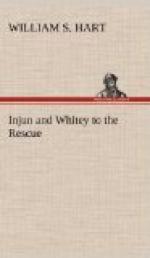So Whitey sat in Dan’s chair, which happened to be the only chair in the room, and was extremely uncomfortable, being all sagged down on one side, on account of Dan’s weight. The book proved to be a several-years-old copy of the Congressional Record, containing the speeches made before Congress at that time, and in addition to being heavy, it was more than dull. Whitey couldn’t understand how Dan found it “absorbin’.” Dan certainly must be a serious-minded person, despite his fat. And yet, from over near the bunk house, Whitey heard loud laughter coming from several men. He reflected hopefully that perhaps the hands were not so solemn as Dan Brayton.
But this hope was ill-founded, for later, when Dan took Whitey to the bunk house, he found all the punchers who were there were reading serious-looking books. Whitey supposed that “like master, like man,” they must be taking after Dan Brayton. He did not know that some of those cowboys couldn’t read at all, and if he had looked close enough he might have seen that some of those who could read were holding their books upside down.
Whitey’s stay at the T Up and Down turned out to be as dull as the Congressional Record. There was an old-fashioned melodeon in the living-room of the ranch house, and it was very much out of tune. One of the punchers could play, and he played, and the others sang hymns, and sang them very badly, and when they had finished the hymns, they started on doleful songs like “The Cowboy’s Lament,” and “Bury Me On the Lone Perare-e-e.”
These seemed to be great favorites with the punchers, and Whitey wondered at it. They were getting less popular with him every minute. Afterwards he learned what may have made them please the men; that almost all the songs sung on the ranges are written by the cowboys themselves, and they may be dismal because of being composed during lonely night rides.
One puncher called “Little” Thompson, who was high and narrow in build—shaped something like a lath, with a face something like an undertaker’s—sang at length. First a doleful ditty that went like this:
“Oh! my name it is J.W. Wright,
I came from Tennessee.
There was a killin’ in th’
mountains, th’ sheriff got his, ye see.
I left my wife an’ babies, them
kids I loved so well,
An’ I’ll find a grave on th’
lone prairee,
Oh! pardners, ain’t it hell?”
After this had dragged out its weary length he got an encore, and responded with this gem:
“We came up over th’ long
trail,
Three thousand cattle strong.
Ned Saunders needed a hair cut,
Fer his hair was too darned long.
“Oh, th’ night was dark an’
stormee,
An’ the Injuns round did yell,
So we herded into a canyon,
An’ th’ sons-o’-guns
come like hell.
“Ned lost his hair, he didn’t
care,
Fer he had lots t’ spare,
Oh, te-tumity tum-tum,”—and
so on.




